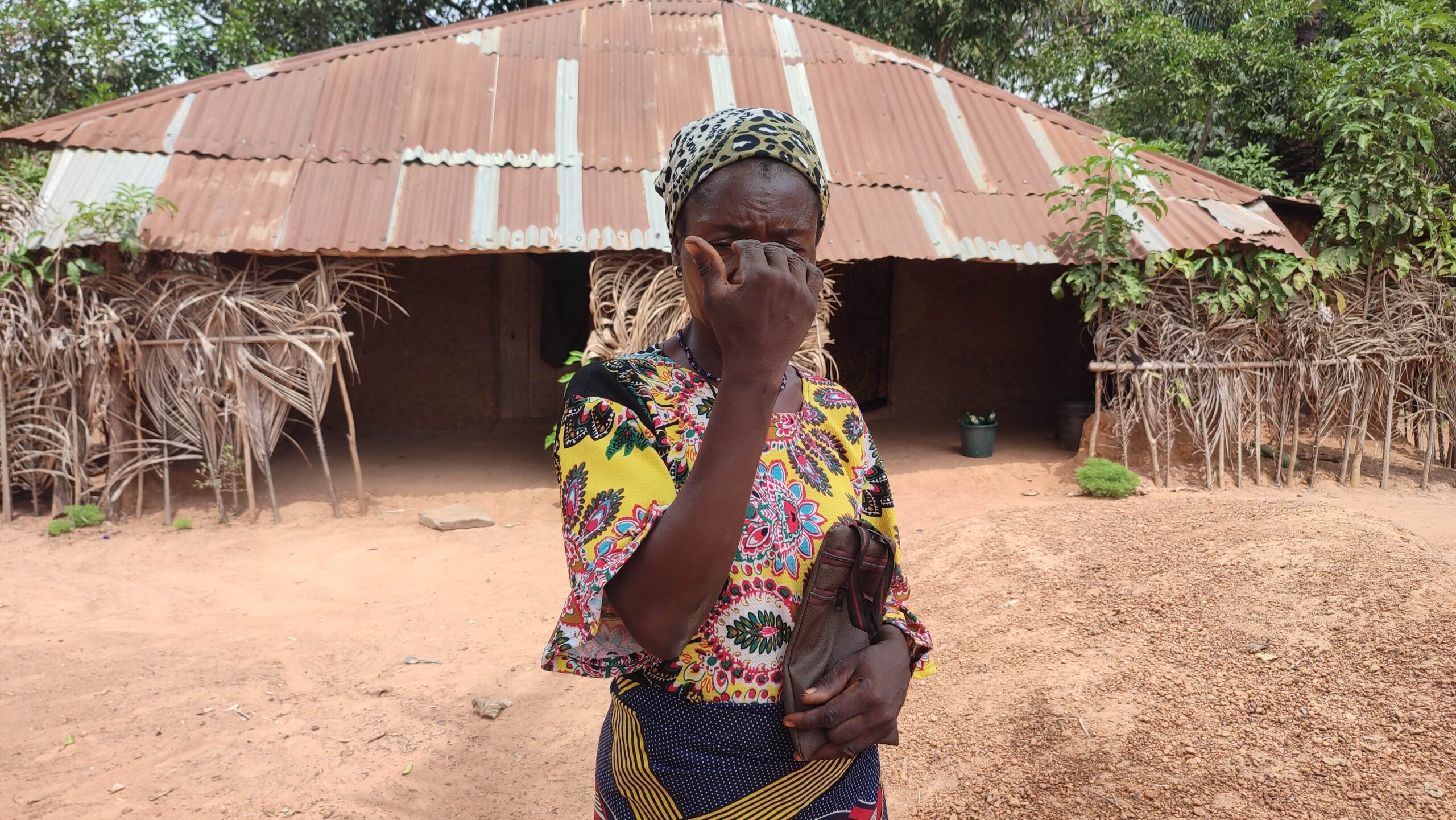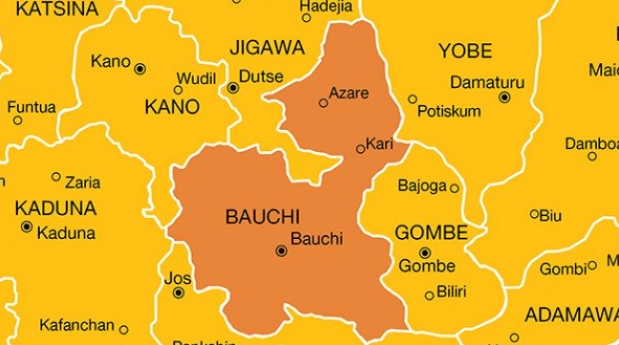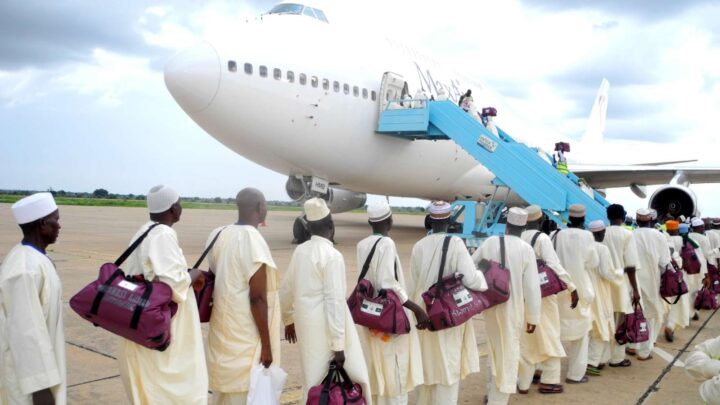Blessing says dust from the blasting affects her eyes
Many communities in Ebonyi state, south-east Nigeria, are located on rocky plateaus which make them a toast for quarry companies. Sadly, while these companies make a fortune from their commercial activities, some of them care less about the welfare of their host communities. In this report, ARINZE CHIJIOKE tells the story of a community where residents have accused a quarry company of destroying their homes and threatening their health with its blasting operation.
Blessing Omi stood behind what used to be a two-bedroom apartment where she lived with her husband and children in Ukwuagba-Ngbo, a community in Ohaukwu LGA in Ebonyi state.
Now, all that is left of the building after it was brought down by heavy vibration from a rock blasting site owned by Master Rock Quarry LTD, a mining company in the community, is the rubble.
The incident happened one afternoon in 2021, Omi said. She had stepped out to visit a friend when she got a call from a neighbour who informed her that her apartment had collapsed.
Advertisement
“I quickly ran back home. When I saw it, I was confused,” she said. “The building had developed several cracks before it finally fell on the same day that the company blasted rock.”
Ukwuagba-Ngbo, like other communities in Ebonyi state, is located on rocky plateaus, rich in geologic features and solid minerals, making it a toast for mining companies like Master Rock which has been blasting rocks since 2009 to source granite and chippings for roads and building constructions.
While there are over 20 villages that make up Ngbo, three, including Aguachi, Okpochiri and Anyawigwe, are closest to the site and have borne the brunt of the company’s operations for years. Some houses, like Omi’s, are less than 1 kilometre from the site.
Advertisement
For about 15 years that the company has worked in Ngbo, vibrations from the quarry site have resulted in the structural cracks of many buildings, some of which have collapsed.
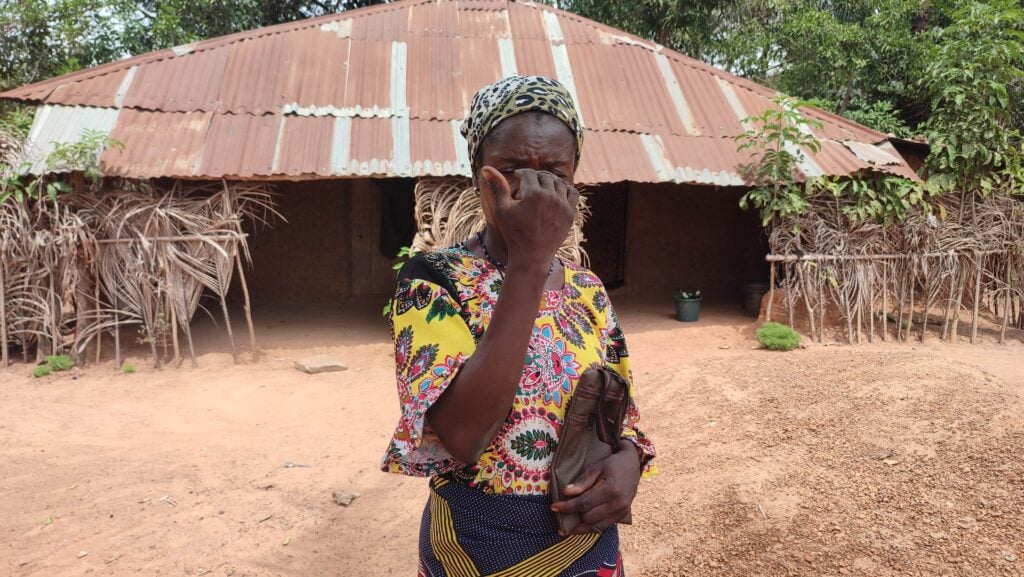
Regardless of any activity they are engaged in, residents of these three villages always scramble out of their homes towards different locations, far from the site, once the siren blares to indicate the commencement of blasting activities. This, according to them, is to avoid being hit by flying rocks ejected from the site or walls that might fall as a result of the reverberating effect of the explosives used for the blast.
Wild fly rock has caused serious injury and death to employees and other persons. It is always a major concern for the blaster, according to research by the Centre for Disease Control and Prevention.
The research showed that injuries due to fly rock and the lack of blast area security accounted for over two-thirds of all blasting-related injuries in surface coal, metal, and nonmetal mines during the period 1978-2002.
Advertisement
Master Rock has made fortunes but also caused the people pain.
In 2019, the ownership of the company and its liabilities were taken over by Omega Engineering Services Limited. The company is into engineering design, construction and procurement.
UNFULFILLED PROMISES
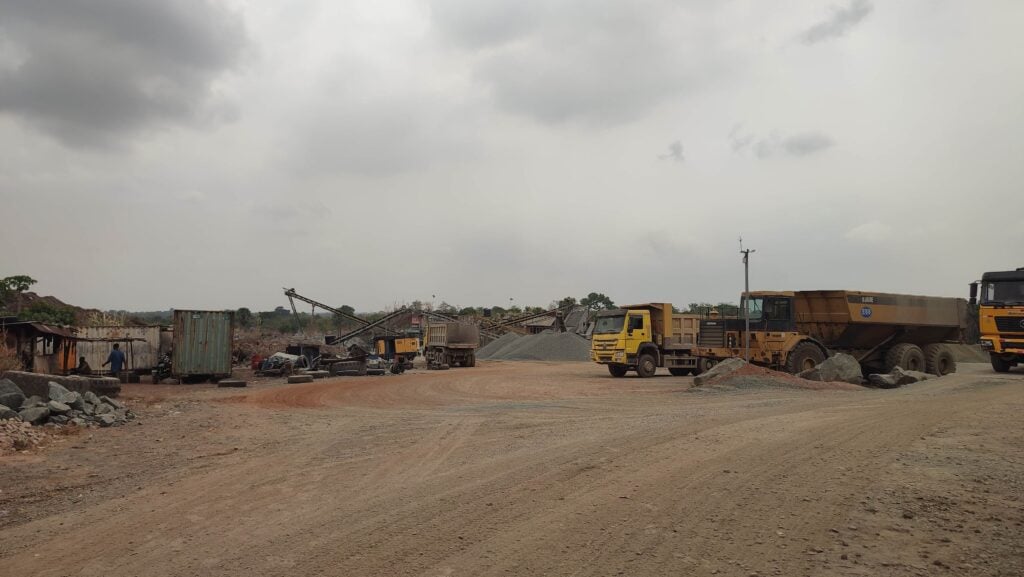
After the building collapse, Omi said some officials from the company visited her and she told them what she had lost and that it would cost about N700,000 for her to rebuild the house. When they left, Elijah Omeh, the public relations officer (PRO) of the company at the time, who hails from Ngbo, came back and gave her N300,000.
Advertisement
“I built a small place where I now manage with my children because the money was not enough and I did not know what else to do. My husband died a year after we built the house,” Omi said.
Back in 2009, before the company began operation, Elijah Ugadu, an elder in Aguachi, said the company reached an agreement with the Aguachi Development Union Ngbo, part of which was that they would provide money for the repair of structural cracks and construct new buildings for those affected by their activities.
Advertisement
According to him, the company also agreed that it would provide water and healthcare for the community. However, Ugadu said the company has consistently failed to comply with the agreements, with residents having to fix their walls. They also trek some miles to fetch water from a hand pump constructed by the federal government, he claimed.
“Each time we meet them, they don’t listen to us and they have damaged our road,” Ugadu said. “Before they agreed to construct a culvert for us, we had to drag the issue with them. The road almost cut into two.”
Advertisement
Findings show that every year, Master Rock gives N400,000 to the community, through the PRO, to distribute among residents — depending on the proximity of their homes to the blasting site as an annual hazard allowance.
Although the hazard allowance was part of a revised agreement reached with the company, community members said it is hardly enough to take care of their health needs as some of them spend as much as N10,000 on drugs yearly.
Advertisement
While those who live in Aguachi — which is the closest of the three villages to the site — receive N5,000 annually per family, others receive between N2,000 and N3,000. There are an estimated 70 houses affected by the company’s operations in Ngbo.
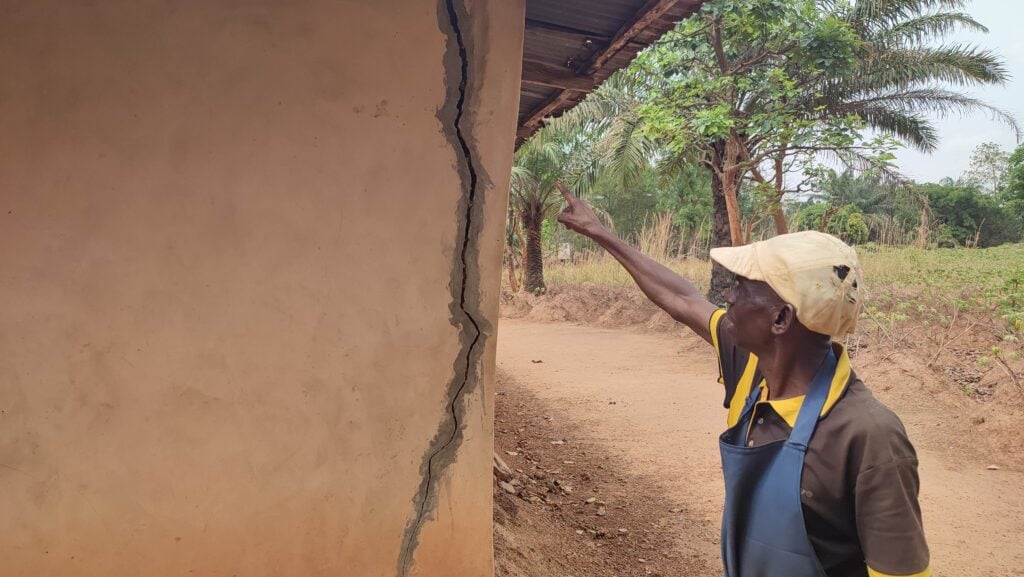
“That is what the PRO gives us,” Jude Eze, an elder in Aguachi, said. “We don’t know if the company gives him more and he is not transparent because we asked him to show us how he shares the money but he refused.”
Some families also said that they have been denied the paltry sum. Others say it does not always come as at and when due. Till now, some claimed that they are yet to receive the payment for 2023, which should have come in March.
In 2022, Omi, whose house was destroyed, said she did not receive the payment. The company’s representative said she was absent when the money was shared. Whenever she asked, she was told that the money was gone.
Omi and other residents said they had asked the company to pay them directly, but it would not listen. They have also asked that the payment should be made monthly since the company operates daily.
Nnamdi Nwandu, whose company bought over the ownership of Master Rock, said he cannot pay the people directly because he does not know them as much as the PRO does. He also confirmed the N400,000 payments as hazard allowance.
HEALTH IMPLICATION
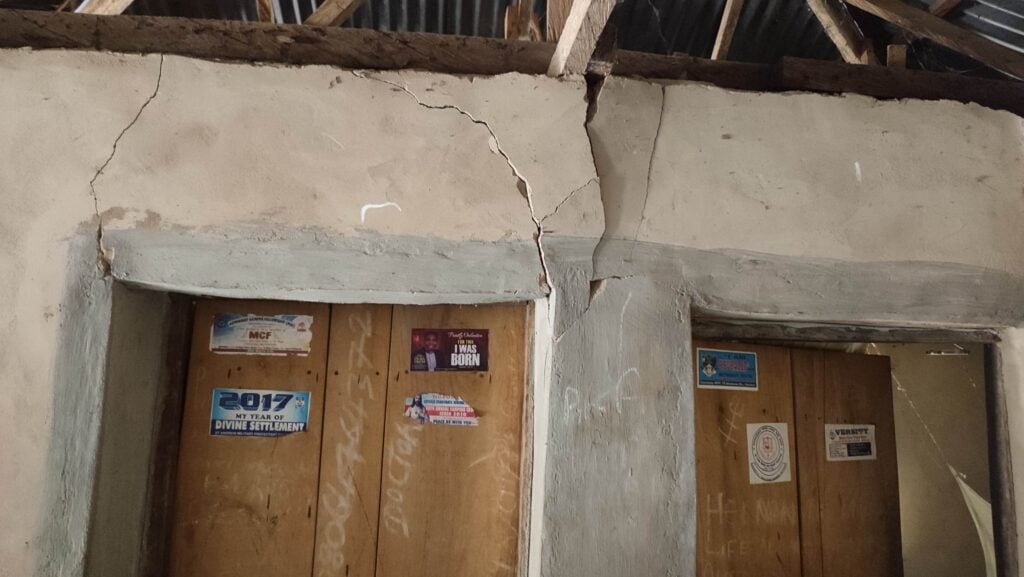
Many residents interviewed said they spend money on medication at least three times yearly as smog-like dust, which emanates from the site and hovers in the sky, inflicts respiratory illnesses on them.
Dust from blasting sites is a major source of air pollution. Previous studies have found that people residing close to quarry sites have a higher prevalence of respiratory symptoms, compared to those not exposed to quarry dust.
A study that investigated how the ecosystem and residents were possibly affected by nearby quarry activity found that the frequency of certain symptoms such as cough, sneezing, asthma, and illnesses increased after quarry activities in the area began.
In Aguachi and Okpochiri, children, women and the elderly constantly battle with cough, sneezing and chest pain. In December, dust affected Evylin Eze’s eyes and she spent over N5,000 treating herself. She said it still hurts her.
Nwandu did not rule out the possibility of the dust spreading and causing harm to the people. He said the company has been using dust suppressors to control the spread. This was also confirmed by Eze who works at the site.
In June 2021, residents of Aguachi protested against the refusal of Master Rock Quarry to pay them compensation for their damaged houses. The residents, who blocked the entrance leading to the quarry site, asked the government to shut down the site if the company continued to operate without regard for the welfare of the people.
Sadly, residents said nothing has changed and that Master Rock has continued to operate with disregard for the agreement reached with the host communities and laws that regulate blasting operations.
Now, many of them, including Eze, said they are looking for alternative locations where they can relocate. Several times, the walls of her house have fallen off, including ceilings.
“When the rocks destroyed the zinc of my house, the company only brought a sheet, regardless of the number destroyed. They have continued to cause us pain without any benefit.”
But another elder in the community, Jude Eze, said leaving is not an option. He owns two structures that are always impacted. He said the management of the company has gone around to inspect them following complaints.
“Nothing has ever come out of it,” he said. “But we cannot leave our land for them. Sometimes, it feels like the ground will sink in because of the vibration.”
Ayangwe Egwuachi, another resident, claimed that one of his houses fell in 2020 as a result of the company’s activities; but he did not receive any compensation to rebuild it even after he complained.
“I have stopped complaining to the company whenever my houses develop cracks because they always send me away and say that I only come when I am hungry,” he said.
Among other things, the level of the ground vibration and the structural response of blasting depends on the explosive type and weight, delay time, blasting technology, soil properties, the distance between the structure and the blasting centre, and susceptibility ratings of the adjacent and remote structures.
But it also depends on the age and type of the structure. In Aguachi and Okpochiri, there are predominantly mud houses, and research has shown that mud walls may crack and deteriorate due to exposure to the sun during hot and dry weather circumstances, improper selection of mud material and faulty foundations.
Nwandu said while he is not ruling out the impact of the blasting operation on buildings due to vibration and the proximity of the blasting site, the possibility of foundational deficiency or weakness of the mud structures cannot also be ruled out.
He claimed that the company also uses slurry explosives which do not have far-reaching impacts like dynamites.
“We have researched and found that some of the houses do not have pillars and strong foundations upon which they are built, hence they can easily also develop cracks on the wall,” he said.
VIOLATION OF ENVIRONMENTAL LAWS
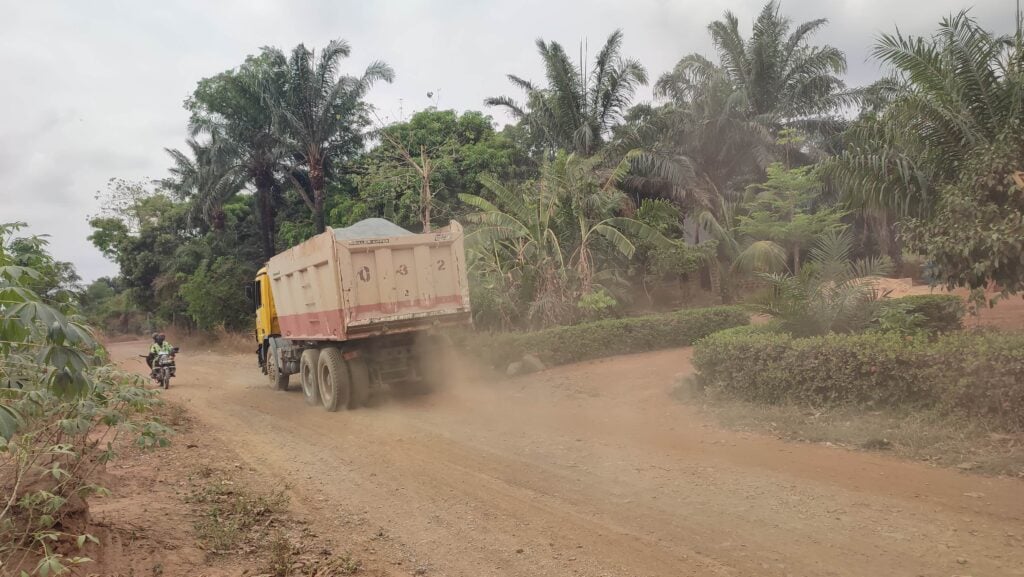
Investigations by this reporter showed that the activities of the company violate provisions of both the National Environmental (Quarrying and Blasting Operations) Regulations, 2013, the Nigerian Minerals and Mining Act (2007) and the Land Use Act 1978.
Part V (20) of the National Environmental Regulations provides that a person shall not locate a quarry or engage in blasting within three kilometres (3km) of any existing residential, commercial or industrial area. However, this investigation showed that the company has been blasting rocks less than a kilometre from residential areas.
It also violates Part V (22) of the regulation which provides that a person shall not blast in such a way that the impact of such blast will cause any form of discomfort or nuisance to the public and residents within 1,000/1km from the epicentre of the site or users of the roads thereof.
However, the company claims that it undertook an assessment in line with Part IV (1) which provides that an Environmental Impact Assessment (EIA) shall be conducted for all new quarries before the commencement of operations as required by the EIA Act of 1992 and Environmental Impact Statement (EIS).
The activities of miners in the state have led to the degradation of land. The landscape in Ebonyi is dotted with pockets of mining pits, either unfinished or abandoned, which leave large open spaces, resulting in environmental degradation and, sometimes, loss of lives.
It is estimated that there are 72 of such abandoned pits in the state, with approximately 200 people said to have been buried alive during the mine blasting operations in the past decade. In Amoffia, another community in Ngbo, there are at least three abandoned pits across different locations.
Reacting to this, Nwandu said it is difficult for any company to say it wants to reclaim or backfill a land where quarrying occurred because the pits are usually dip.
“But they can also be turned into irrigation sites to help farmers in dry season farming,” he said.
To avoid the menace of abandoned pits, he said the government can reduce the amount of licence it gives to quarry companies to operate in different locations. At best, he said that they can be allowed to operate within a certain area.
A source, who preferred to remain anonymous, told this reporter that efforts to get successive administrations to control the activities of mining companies in the state have not yielded any results because they were benefitting from the company.
“A former commissioner from Amoffia was always at the forefront of negotiations between companies and host communities. To stop communities from revolting whenever they come in, companies pay as much as N5 million or more before the negotiation begins,” the source said.
“Sadly, whenever the money comes in, it is shared between the commissioner, community leaders and other big men, while nothing gets to community members who bear the brunt of the mining activities.
“Nobody speaks for the people whose houses suffer the impact and nobody dares to challenge the leaders. Even churches in Ngbo are also given some money so they don’t speak out about the exploitation by the company.”
Taiwo Ogunwumi, an environment expert, said although rock blasting itself is not a direct contributor to climate change, some aspects of the processes associated with mining generally, the transportation of mined materials and processed minerals to various destinations can involve the burning of fossil fuels, releasing carbon dioxide (CO2) and other pollutants into the atmosphere.
“The extraction and processing of certain minerals, like aluminium and cement, can be energy-intensive and release substantial amounts of carbon dioxide during production,” he said.
He however recommended that efforts must be made to make mining and extraction practices more sustainable and environmentally friendly, adding that technologies and practices such as renewable energy adoption, energy-efficient processes, and reclamation efforts must be implemented to minimize the environmental impact of mining activities.
COMPANY: WE PAY COMPENSATION
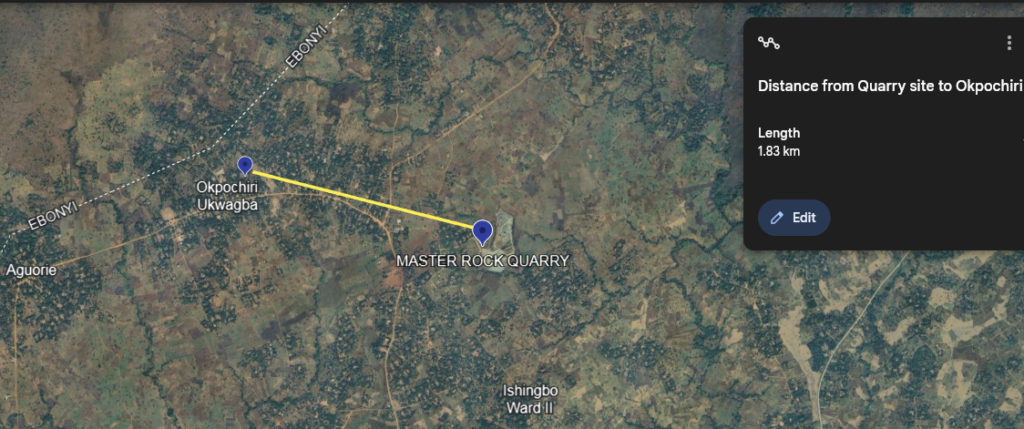
This reporter visited Nwandu at his office in Enugu where he brought out documents showing payments made to different individuals as compensation for damages. While he did not allow this reporter to take snapshots of the payments, they ranged between N50,000 to a million, depending on the degree of damage to structures. He also brought out pictures of buildings with cracks taken from the community.
“When we came in, there were backlogs of payments. But we have compensated over 30 people and we pay in batches, contrary to claims by the people. We keep all the records as proof and ensure that they sign when we pay,” Nwandu said.
He claimed that some individuals have also tried to take advantage of the company by bringing names of dead people and demanding compensation for them. He added that others were also coming to get paid, whether or not their cracks had anything to do with the company’s activities.
“We had to always involve the ministry of solid minerals, and for every compensation, we get an evaluator while the community gets one for a combined assessment with the ministry after which payments are made,” he noted.
Nwandu confirmed that the company had an agreement to execute some development projects, including those it inherited from the former owners across the three villages. He said that while some have been executed, a lot more remain unexecuted due to a lack of cooperation from the people and financial challenges facing the company.
“For instance, we wanted to drill two boreholes in Okpochiri but the people demanded money instead and we refused. Now, they have agreed and we have completed the project,” he said, displaying a copy of the letter.
He said the company has finalised preparation to construct a community hall for the people and also finish a school project that started in Aguachi in November 2023.
On the road leading to the site, which is in bad condition due to the heavy trucks that constantly ply it, he said: “We regularly construct earth roads to ease transport because we cannot do asphalt.”
When contacted for comments on the findings of this investigation, Victor Chukwu, commissioner for environment in Ebonyi state, said the government was not aware of the challenges faced by the Ngbo community as no one has ever complained.
“We have never had anyone complain to us from the community. But I am aware that miners operate across the state, sometimes at night, aided by indigenes of communities where they operate to maximise profit,” the commissioner said.
He, however, pledged to visit Ngbo and other communities to enforce the laws regulating mining activities in the state and ensure the protection of the environment and welfare of the people.
Add a comment
